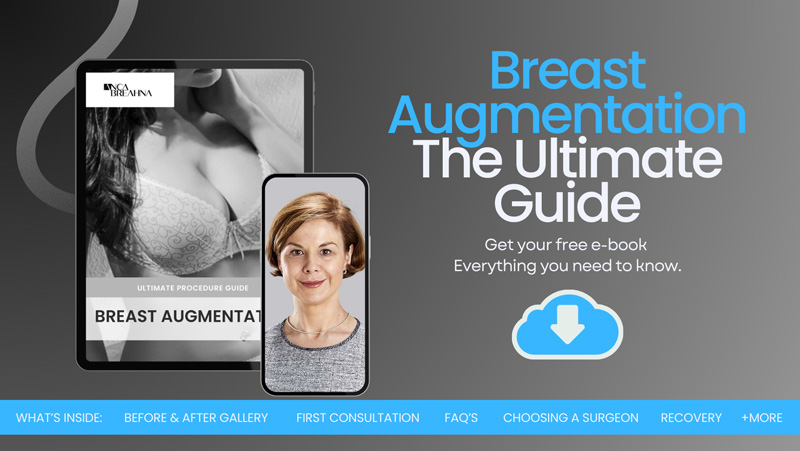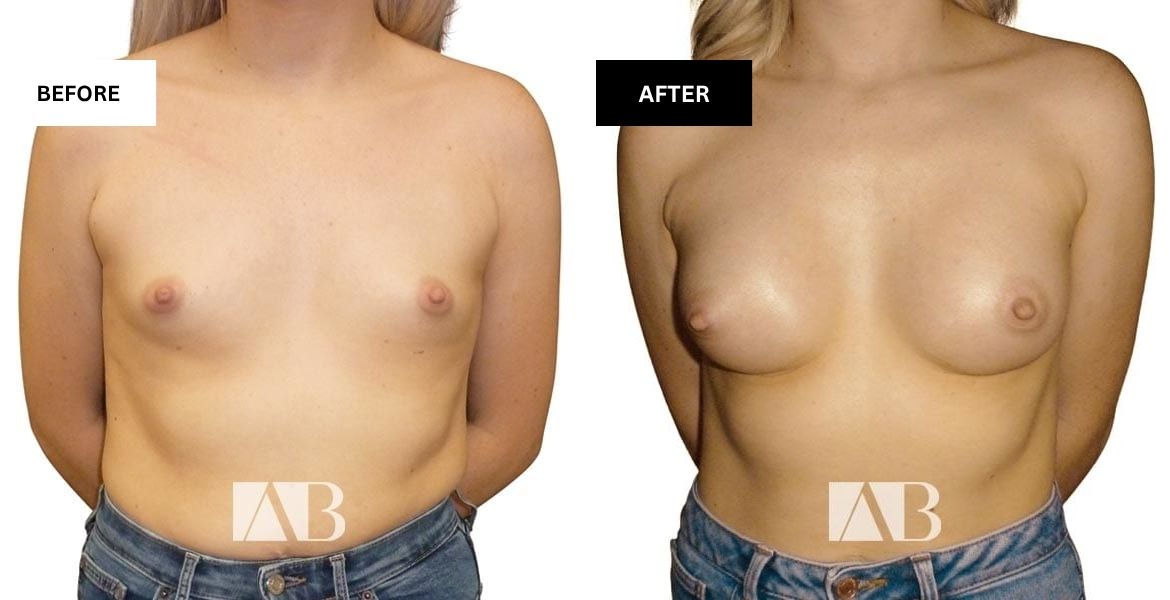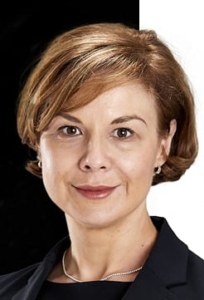
- Factors Influencing Breast Size and Solutions to Correct Small Breasts
- Take our Plastic Surgery Quiz to find out if you'd be a good candidate for cosmetic surgery.
- The Biology of Breast Development
- When Do Breasts Stop Growing?
- Factors Influencing Breast Size
- Genetics
- Hormonal Fluctuations
- Nutrition and Weight
- Physical Activity
- Download Miss Anca Breahna Breast Augmentation Guide
- When to Consider Breast Augmentation
- Breast Augmentation: Procedure, Benefits, and Risks
- Breast Augmentation Before and After Photos
- How to Choose the Right Plastic Surgeon for Breast Augmentation in Chester
- FAQs about Breasts and Breast Surgery
- At what age do breasts generally stop growing?
- Can lifestyle factors affect when breasts stop growing?
- What are the different types of breast augmentation surgeries available?
- What is the recovery time for breast augmentation surgery?
- Are there any risks associated with breast augmentation surgery?
- Can breast augmentation surgery affect breastfeeding in the future?
- How do I choose the right surgeon for breast augmentation surgery?
- Can pregnancy affect breast size and growth?
- What is the average cost of breast augmentation surgery?
- Can I get a breast augmentation surgery if I have a medical condition?
- Further Reading about Breast Surgery with Consultant Plastic Surgeon Anca Breahna
- Medical References about When Do Breasts Stop Growing
Factors Influencing Breast Size and Solutions to Correct Small Breasts
Understanding when breasts stop growing is a question often asked by many young women. Knowing about the biology involved, the factors influencing breast size, and the possible role of plastic surgery can help you comprehend your body better.
Your body is a complex and beautifully orchestrated system. It transitions through numerous stages as you grow, each one uniquely impacting your physical, emotional, and psychological well-being. As you progress into adolescence, you might notice several changes in your body. The growth of breasts is one of these significant transformations, often marking the onset of puberty in females.
This blog aims to provide a comprehensive overview of breast development. It will discuss the biology of breast growth, explore the timelines and factors affecting it, discuss the causes of small breasts, and shed light on the role of plastic surgery, specifically breast augmentation.
Anca Breahna is a highly regarded Consultant Plastic Surgeon who specialises in aesthetic and reconstructive plastic surgery, including a range of breast procedures. She offers a unique female perspective in her field, characterised by empathy, attention to detail, and personalised care. Anca Breahna has extensive training and over 15 years of practical experience, particularly in aesthetic breast and body surgery.
Take our Plastic Surgery Quiz to find out if you’d be a good candidate for cosmetic surgery.
The Biology of Breast Development
Breast development is an essential part of your biological journey. It starts around the onset of puberty, typically between the ages of 9 and 11, and continues until your early or mid-20s. This process, known as thelarche, is initiated by the release of hormones like oestrogen and progesterone.
During the early stages of puberty, the hormonal surge leads to the development of mammary glands and ducts in your breasts. The fat, connective tissue, and ligaments also start to increase, giving your breasts their size and shape. As you transition through puberty, your breasts may undergo several changes, growing in size and becoming rounder.
Breast development is not just about growth. It’s a complex process that involves the coordinated actions of various hormones, genetics, and environmental factors.
When Do Breasts Stop Growing?
The question “When do breasts stop growing?” can have varying answers. Generally, breasts continue to grow until the age of 17-18. However, they may keep developing until your early or mid-20s. The growth rate and the time when they stop developing differ from person to person, largely due to genetic and hormonal factors.
It’s important to remember that changes in your breast size and shape can occur throughout your life. Various factors, such as weight fluctuations, pregnancy, breastfeeding, and ageing, can impact your breasts’ appearance. So, even if your breasts have stopped growing in your early 20s, they might still undergo changes later in life.
Factors Influencing Breast Size
Understanding the various factors that influence breast size can provide a deeper insight into one’s bodily development and help in making informed decisions regarding potential modifications or enhancements. Here are the primary factors that play a pivotal role in determining breast size:
Genetics
- Family Lineage: Your genetic makeup, inherited from your family, predominantly dictates your breast size. Observing the breast size of your maternal relatives can often give you a predictive insight into your potential breast size
- Genetic Disorders: Certain genetic conditions, such as Turner syndrome, can impede breast development, leading to smaller breasts
Hormonal Fluctuations
- Puberty: Hormonal changes during puberty significantly affect breast development. The levels of oestrogen and testosterone in the body can dictate the size of the breasts
- Throughout Life: Hormonal fluctuations occurring due to various life stages or medical conditions can alter breast size over time
Nutrition and Weight
- Diet: Your diet and nutritional intake can influence your breast size. A nutritious diet supporting overall growth can potentially aid in healthy breast development
- Weight Fluctuations: Since breasts are partly composed of fatty tissues, weight gain or loss can result in changes in breast size
Physical Activity
- Strength Training: Engaging in exercises, especially strength training targeting the chest muscles, can alter the shape of the breasts, albeit not affecting the actual size significantly
Download Miss Anca Breahna Breast Augmentation Guide

When to Consider Breast Augmentation
Breast augmentation, a type of plastic surgery procedure, is an option to consider if you’re unsatisfied with your breast size or shape. It involves placing implants or transferring fat to enhance the size and shape of your breasts. It can provide a solution for women who are concerned about having small breasts or those who have experienced changes due to factors like pregnancy, weight loss, or aging.
Deciding to undergo breast augmentation is a personal decision that should be based on your needs, expectations, and overall health. It’s crucial to understand the procedure, its benefits, and potential risks before making a decision.
Breast Augmentation: Procedure, Benefits, and Risks
Breast augmentation involves a surgical procedure that usually takes between one and two hours. It may be performed under general anaesthesia. Anca makes an incision, creates a pocket to place the implant, inserts and positions the implant, and then closes the incision.
There are numerous benefits of breast augmentation. It can enhance your breast size and shape, improve balance of breast and hip contours, and enhance self-confidence and self-image. However, like any surgical procedure, breast augmentation carries potential risks, including infection, changes in nipple or breast sensation, and implant leakage or rupture. It’s essential to discuss these potential risks with your plastic surgeon before deciding on the procedure.
Breast Augmentation Before and After Photos
How to Choose the Right Plastic Surgeon for Breast Augmentation in Chester
Choosing the right plastic surgeon is crucial to the success of your breast augmentation procedure. Ensure that the surgeon is board-certified, experienced in performing breast augmentation, and has a history of successful outcomes.
Take your time to research, meet with potential surgeons, ask questions about their experience, ask to see before and after photos of their previous patients, and ensure you feel comfortable with them. Remember, the plastic surgeon’s expertise and your comfort with them are vital for a successful procedure and satisfaction with the results.
FAQs about Breasts and Breast Surgery
At what age do breasts generally stop growing?
- Breasts generally stop growing in the late teens to early twenties. However, this can vary greatly from person to person, and some individuals may experience growth or changes in their breasts well into their twenties.
Can lifestyle factors affect when breasts stop growing?
- Yes, lifestyle factors such as diet and exercise can potentially influence breast development. Hormonal fluctuations, which can be affected by lifestyle, can play a significant role in breast growth.
What are the different types of breast augmentation surgeries available?
- There are primarily two types of breast augmentation surgeries: breast augmentation with implants (which can be saline or silicone) and fat transfer breast augmentation, where fat is taken from another part of the body and injected into the breasts.
What is the recovery time for breast augmentation surgery?
- Recovery time can vary depending on the individual and the type of surgery performed. Generally, most people can return to work within a week or two, although full recovery might take several weeks. It is essential to follow the plastic surgeon’s post-operative care instructions to facilitate a smooth recovery.
Are there any risks associated with breast augmentation surgery?
- Yes, as with any surgery, there are risks involved. Some potential risks include infection, changes in nipple or breast sensation, implant leakage or rupture, and the formation of scar tissue around the implant (capsular contracture). It is crucial to discuss all potential risks with Anca before deciding to proceed with surgery.
Can breast augmentation surgery affect breastfeeding in the future?
- Breast augmentation surgery can potentially affect breastfeeding, although many people are still able to breastfeed successfully after the surgery. It is best to discuss this concern with your plastic surgeon, who can advise on the best surgical approach to minimise any potential impact on breastfeeding.
How do I choose the right surgeon for breast augmentation surgery?
- Choosing the right surgeon is a critical step in ensuring a successful outcome. It is recommended to choose a board-certified plastic surgeon with experience in breast augmentation surgeries. You should also look at before-and-after photos of their previous surgeries and read reviews from other patients to make an informed decision.
Can pregnancy affect breast size and growth?
- Yes, pregnancy can significantly affect breast size due to hormonal changes that occur during this period. Many individuals experience an increase in breast size during pregnancy and breastfeeding. It is worth noting that the breasts may return to their pre-pregnancy size or experience changes in shape and fullness after breastfeeding ends.
What is the average cost of breast augmentation surgery?
- The cost of breast augmentation surgery can vary widely depending on a variety of factors including the surgeon’s experience, the type of surgery chosen (implant type or fat transfer), and the geographic location of the surgery centre. It is important to note that this is a substantial investment, and potential patients should ensure they are financially prepared for all the costs involved, including any unforeseen complications that may arise.
Can I get a breast augmentation surgery if I have a medical condition?
- It depends on the specific medical condition. Certain medical conditions can increase the risks associated with surgery. It is essential to have a detailed discussion with your healthcare provider and surgeon to understand the potential risks and to determine whether you are a suitable candidate for surgery. They may require a full medical evaluation, including lab tests and a physical exam, to make an informed decision.
Further Reading about Breast Surgery with Consultant Plastic Surgeon Anca Breahna
- Read more about Breast Uplift with Implants
- Read more about Fat Transfer to Breasts
- Read more about Breast Implant Choices
- Read more about Breast Asymmetry Surgery
- Read more about What are Pointy Breasts or Puffy Nipples?
- Read more about Treating Small Breasts/ Hypomastia/ Amastia
Medical References about When Do Breasts Stop Growing
- Normal Breast Development and Changes
- At what age do girls stop growing?
- How breasts develop during puberty
- Breast Changes During Pregnancy
- Age-Related Breast Changes: What You Should Know




 Ms Anca Breahna, PhD, MSc, FEBOPRAS, FRCS (Plast) is a highly regarded Consultant Plastic Surgeon specialising in the field of Aesthetic and Reconstructive Plastic Surgery. Anca performs a range of
Ms Anca Breahna, PhD, MSc, FEBOPRAS, FRCS (Plast) is a highly regarded Consultant Plastic Surgeon specialising in the field of Aesthetic and Reconstructive Plastic Surgery. Anca performs a range of 